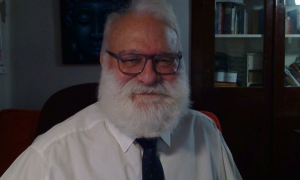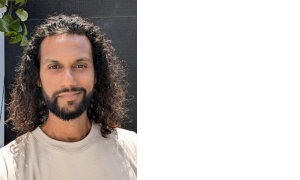
Oct 31 2025.
views 150By Tahaan Jayewardene
Tomorrow is World Vegan Day, celebrated by many vegans globally. It represents much more than just their dietary choices, but ethical principles that impact their day-to-day choices.
In Sri Lanka, many people may not know much about veganism, what it is, or the reasons people would choose to be vegan. Three vegans share their perspectives, common misconceptions, and hidden ingredients in food that may concern non-vegans as well.
What is veganism?
Prof. Craig R. Gardner, Earth-loving vegan professor of Drama/Theatre says that for him, veganism is finding alternatives to harming the lives of our fellow earthlings. “And by earthlings, I mean fellow animals,” he said.

The congested cages in which chickens are grown, where they don’t have the freedom to either eat naturally or live naturally, and are raised to be killed, is not very philosophically sound, he added.
He also shares environmental concerns. He mentioned how the pollution aspect of raising livestock doesn't do well for the greening of the planet, and for the carbon footprint. By doing this, we are harming ourselves, he added.
“Increased livestock production under increasing global human population and wealth results in increased discharge of livestock excreta, which may cause more greenhouse gas and ammonia emissions,” according to the 2021 study titled, Environmental impacts of livestock excreta under increasing livestock production and management considerations: Implications for developing countries.
Priyanga Gamage, a Vegan and Animal Rights Activist, said the simplified definition of veganism is to stop or end the exploitation of animals. He said that some vegans, including himself, simplify it as ending the use of animals, applicable for not just food, but for clothes, for elephant rides. “For me, veganism, and for most people, veganism is about stopping the use of animals for human benefit.”

He also mentions that veganism is not just about diet, which is what most people might think, but that it's an ethical principle of rejecting the use of animals for human benefit.
Tashie Jackson, Activist and Owner of Smokey’s – The Brownie Bar (dessert shop) and Soy Story (soy milk manufacturer), talked about her definition of veganism. “I try not to do things that would add to the industry,” she says. She also commented on non-vegan industries like clothes, meat, dairy, or any animal product. “If you're buying leather from a store, you're funding the industry with your money.” She added that it's like voting, you’re your dollar.
She said that if someone finds it difficult being a 100% vegan, she sees a lot of value if they can do the other 99.9% of things, since that will make a difference to these industries.
Hidden Ingredients
Prof. Gardner also mentioned how there are a lot of people who are unaware that there is gelatin in jelly. “If you see gelatin on the ingredients, that means rendered down animal bones.” He mentions the jelly packets and that there are vegetarian brands as well. “I think that if people were aware of it, they wouldn't buy that jelly packet, they'd buy the vegetarian one.”
Tashie Jackson also mentioned beef and pork gelatin being in food products that people might not be aware of, mentioning the presence of gelatin in marshmallows. Jackson also talked about non-dairy creamers. She mentioned how it contains milk, that they take out the lactose but keep the rest of the milk components.
“Legally, you can call something non-dairy if you take the lactose out, but it still has cow’s milk in it.” She mentions they call it nondairy, since taking the lactose out would prevent anyone from becoming allergic to it. “It should really be called lactose-free, but it's called non-dairy,” added Gamage.
Misconceptions
“One of the biggest misconceptions is that veganism is a Western concept, and we don't have vegan food in Sri Lanka,” said Jackson, adding that many people have said this to her.
“But actually, parippu, sambol, and string hoppers are vegan. Vegans overseas are mind-blown when I tell them that even meat-eaters eat vegan breakfast for the most part in Sri Lanka.” For example, “Thosai, Vade, String Hoppers, Kiribath,” she added. “Because your rice and curry are vegan except for the meat curry, which is separate.”
“I've been to 30 different countries and Sri Lanka is probably one of the easiest countries you can be vegan,” added Gamage.
Jackson also said that one misconception is that vegans don’t like meat. She added that it's not that vegans don’t like meat or don’t like the taste of meat. She questioned, if that were the case, why would there be fake meat or milk products? “I think it's important to state that it was never about taste buds,” but rather about the ethical reasons.
Relevance
“In 2025, collaborative research by YouGov and Veganuary calculated that approximately 25.8 million people globally tried veganism in January 2025,” according to The Vegan Society
website. It also stated that in 2021, Google searches for 'vegan food near me' experienced a more than 5000% increase.”
Whether or not we choose to be vegan, agree with its principles or not, being aware of the rising demand for vegan alternatives and understanding some of our fellow humans a bit better has both personal and economic merit.
1 Comments
Prof. Craig Gardner says:
Nov 02, 2025 at 09:00 pmI am in awe of the balanced and well written article by Tahaan Jayewardene. I must say, after being interviewed by her, I wondered how she could organize my professorial rambling! She truly organized and represented her thoughts on veganism in a fair and interesting way! Prof. Craig